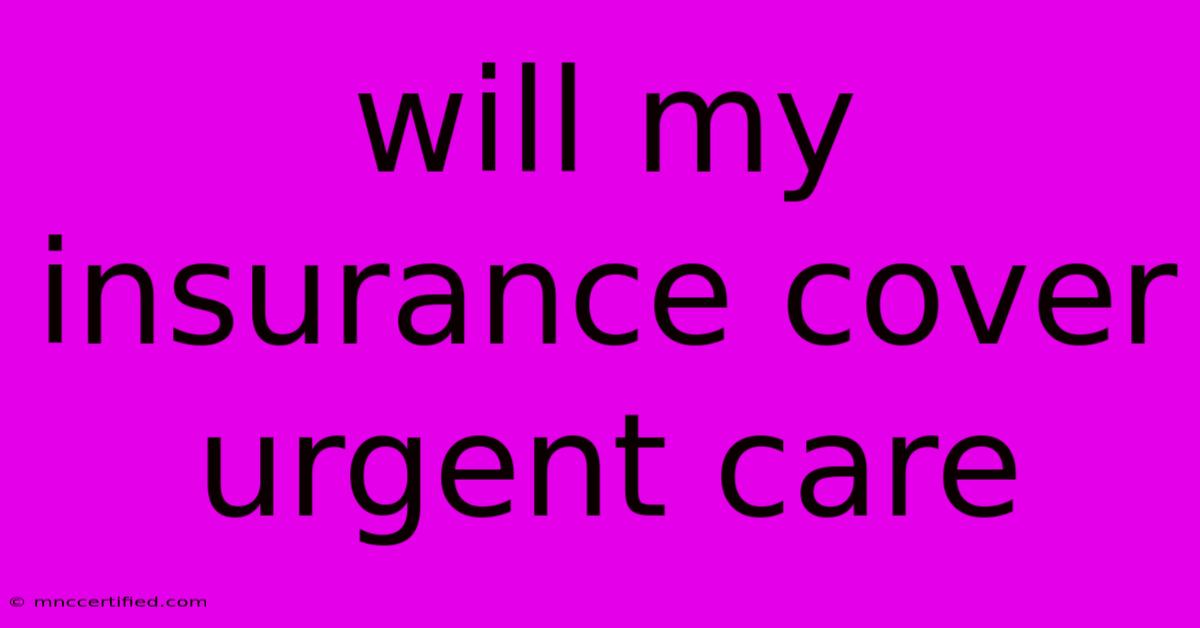Will My Insurance Cover Urgent Care

Table of Contents
Will My Insurance Cover Urgent Care? A Guide to Understanding Your Coverage
Going to urgent care can be a convenient and cost-effective solution for non-life-threatening medical issues. But before you head there, you probably have one crucial question on your mind: Will my insurance cover it?
The answer, unfortunately, isn't a simple yes or no. Your insurance coverage for urgent care depends on a variety of factors, including your specific plan, the nature of your medical issue, and your location.
Understanding Your Insurance Plan
Here's a breakdown of key elements to consider:
- Network: Does the urgent care facility you plan to visit belong to your insurance network? If not, you'll likely face higher out-of-pocket costs.
- Copays and Deductibles: Check your plan for copays associated with urgent care visits. Also, understand your deductible, which is the amount you pay out-of-pocket before insurance kicks in.
- Coverage Limits: Some plans may have limits on how many urgent care visits they cover per year.
What Conditions Does Urgent Care Cover?
While urgent care facilities are equipped to handle a wide range of non-life-threatening conditions, there are limits to what they can address. Here's a general overview:
Conditions typically covered:
- Minor injuries: Cuts, sprains, strains, burns (minor), broken bones (in some cases)
- Illnesses: Flu, strep throat, ear infections, urinary tract infections, bronchitis
- Other: Allergies, skin rashes, insect bites, headaches, stomach aches
Conditions that may require a doctor's visit:
- Severe injuries: Major trauma, deep wounds, head injuries, loss of consciousness
- Serious illnesses: High fever, persistent chest pain, severe vomiting or diarrhea
It's crucial to note: Each insurance plan may have different coverage limitations. If you have doubts, contact your insurance provider directly.
Tips for Maximizing Your Coverage
- Verify coverage before your visit: Call your insurance company to confirm the urgent care facility is in your network and to clarify your copays and deductibles.
- Ask about pre-authorization: Some plans may require pre-authorization for certain urgent care visits.
- Seek alternative care options: If your condition isn't covered by urgent care or your out-of-pocket costs are high, consider telehealth options or seeking treatment at a primary care physician's office.
Conclusion
Whether or not your insurance will cover your urgent care visit depends on your specific plan and the medical issue at hand. By understanding your insurance coverage and taking proactive steps, you can avoid unexpected costs and ensure you're receiving the right care for your needs.
Remember: When in doubt, always contact your insurance provider for clarification. Their expertise can save you money and frustration in the long run.

Thank you for visiting our website wich cover about Will My Insurance Cover Urgent Care. We hope the information provided has been useful to you. Feel free to contact us if you have any questions or need further assistance. See you next time and dont miss to bookmark.
Featured Posts
-
Dogecoin Rises Elon Musks Impact
Nov 13, 2024
-
Alliant National Title Insurance Co
Nov 13, 2024
-
Prue Leith Age Is For Recklessness
Nov 13, 2024
-
Verizon Fi Os Outage Resolved Service Restored
Nov 13, 2024
-
Breunig V American Family Insurance
Nov 13, 2024